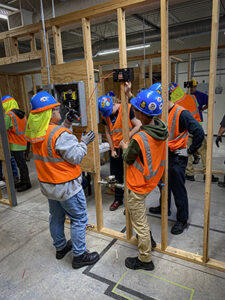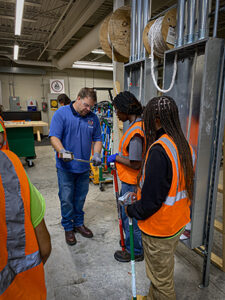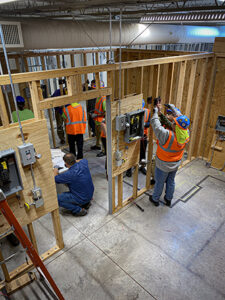I.B.E.W. Local 110 Shows MTA Interns What it Takes to be an Electrician
Minnesota Trades Academy (MTA) interns walk a day-in-the-life of an electrician at I.B.E.W. Local 110 in St. Paul, Minnesota.
St. Paul, Minnesota – To think, when it comes to electricity, it all started with a wire, a kite, and lightning. Today, the world’s dependence on electric energy is immense. Between lighting, data operations, electric vehicles, and entertainment applications, electricity is quite literally the current that powers our day-to-day lives.
A career with this much impact is a great fit for young people who want a rewarding career. It’s important for young adults considering a career in the construction trades to gain exposure to the countless opportunities available in the electrical workforce.
For some young adults, entering adulthood and choosing a career path is an intimidating concept. Finding your “thing,” while also harboring the desire to be properly rewarded for hard work can place stress on one’s decision-making process.
To help young people make informed decisions, the Minnesota Trades Academy (MTA) offers a paid summer construction internship experience for selected high school youth. MTA is a program funded and conducted by the Construction Careers Foundation, a Minnesota-based nonprofit organization whose mission is to “increase the diversity of entrants into the construction trades and foster long-term construction careers.”
In the summer of 2023, groups of MTA interns gained hands-on experience in the electrical trades at the I.B.E.W. Local 110, where they walked in the shoes of an electrician for a day. Tim Garcia, Training Director, and Nicholas Judge, Assistant Training Director at I.B.E.W. 110, guided the interns through a day of lectures and hands-on activities, exposing them to the applications and conditions within the electrical trades.
“The fact that MTA allows interns to get into a location and experience the different trades is amazing. When I was in high school, there was nothing like MTA. There’s a lot of misconceptions about electrical work out there, so if you get to experience what an electrician does and see their daily experiences, you might have a totally different mindset of what you think an electrician does versus what we actually do,” said Garcia.
Getting down to the nitty, gritty basics
MTA interns kick-started their day at I.B.E.W. 110 with an orientation, during which Garcia laid down some ground rules and presented some basic information for interns to keep in mind throughout the day. Garcia offered insight into the apprenticeship program with I.B.E.W. 110. Every trade has their own apprenticeship requirements and expectations, so relaying this information helps interns differentiate the next steps they can take walking into their future careers.
Then, the interns got an introduction to what an electrician really does on a daily basis. As it turns out…it depends. There are a variety of sectors available in the electrical industry, such as industrial, commercial, and green energy work. (Visit CCF’s careers page for more information about a career in the electrical trades.)
Garcia, who has 38 years of electrician work under his belt, and Judge, whose been in the field for 20 years, offered insight and gave advice based on their personal experience in the industry.
“When I stand in front of the interns, I share my journey with them. I’ve worked in eight different trades within the electrical industry. I tell them there’s a lot of branches to electrical work and they can steer their career towards whatever they’re passionate about,” said Judge, who started out in residential, then commercial, heavy industrial, medium voltage terminations and programmable logic controllers. He then became an estimator, an instructor, and is now an assistant trainer – proving the possibilities are truly endless.
In addition to sharing their work experiences, Garcia and Judge listed other important factors to being in the electrical trades. Safety is heavily stressed, as well as harboring organizational skills, leadership abilities, responsibility, and time management.
“The biggest thing I would say – and this goes for any of the trades that you might get involved with – is to be on time. Show up when you’re supposed to be there, maybe even a little bit early. Show interest in what you’re doing, ask questions, and have a good attitude. There’s not a person in the world that won’t take you under their wing and show you what needs to be done to make you successful if you take that kind of approach,” said Garcia.
“Technically, anything that requires power is our work. So, the variety is second to none. It leaves a lot of room for explanation for us, and we just want to make sure that the interns are aware of what they’re signing up for, not only the conditions on the job,” said Garcia.
The conditions are more physical than some might expect. Electricians often work on ceilings of varying heights. The job requires preparing oneself to work in different conditions: indoors and outdoors, in both hot and cold temperatures.
Practice and Theory All at Once
Having a solid background in mathematics is essential to a career as an electrician. After Garcia’s career overview, Judge stepped in to cover some basic algebra with the interns, teaching them graphing and right-angle trigonometry. After the theoretical overview, Judge demonstrated those same math skills, this time using a conduit bender – a tool that electricians use to strategically bend tubes that protect electrical wiring.
“We took everyone into the shop and they started bending up conduit for themselves right then and there. The interns took that math and applied it to the conduit bender, which is something electricians do all the time,” said Judge. “We see diverse reactions amongst the interns when they come to our facility. Once we get them on their feet and get them into the shop area, that’s where we see a lot of engagement because they take what they learn in the lectures and apply it to a real-world situation.”
Exposure and hands-on experience are what really tie everything together. A classroom setting sometimes limits students who prefer hands-on work, so breaking out of the lectures and getting to work on a real-world example is crucial to figuring out what works best for everyone.
Educators: Get Involved Today
Nothing is more important than exposure. Getting high school youth involved in the construction trades earlier on can help them make more mindful and impactful decisions going into their future careers. MTA is a great way to get youth thinking about their careers and working towards their futures.
“I would suggest that more teachings should gear towards trades mathematics, and just trades exploration in general. If there’s ever a need for a speaker or group to come into class, every trade is always available for spreading awareness and sharing more information,” said Judge.
“School counselors and parents themselves are finally seeing that the trades aren’t a second choice, but that it’s a great career path. It’s one that allows you to not have any kind of student debt. It’s a great path to a very respectful and rewarding career,” said Garcia.
“I’ve been working with MTA in this position for seven years now. The interns always have great participation and they’re great students. CCF is a great organization with good leadership, and I think they’re doing a lot of really important work,” said Garcia.
Educators seeking guidance in informing their students about a career in construction, or hoping to pass along the opportunity to join the Minnesota Trades Academy, can visit the Educator Resources page on ConstructionCareers.org.
CONSTRUCTION CAREERS FOUNDATION: Take Control Over Your Future
For more resources regarding a career in construction, visit www.ConstructionCareers.org.
For more stories similar to this one, view the Construction Careers Foundation Blog page.



